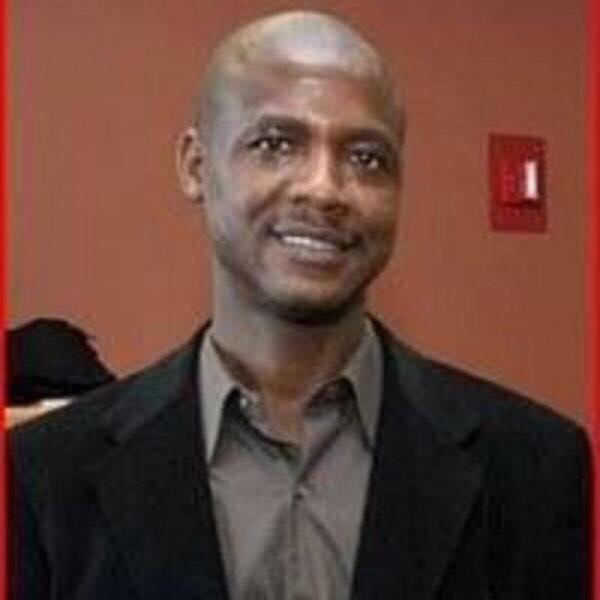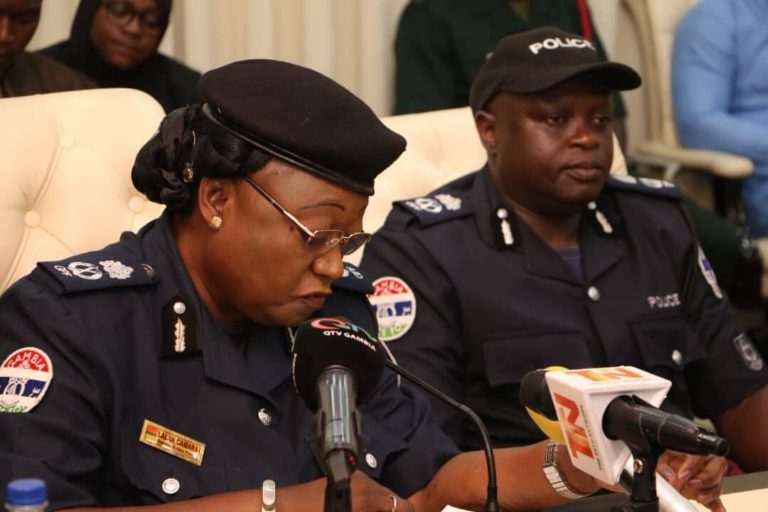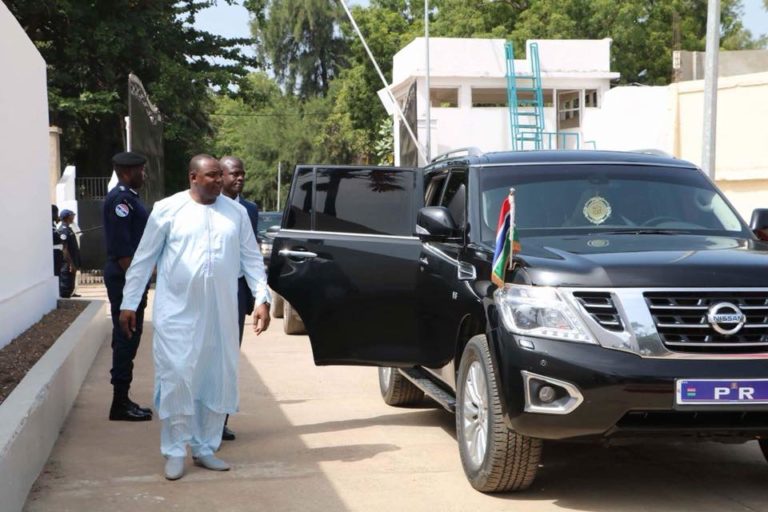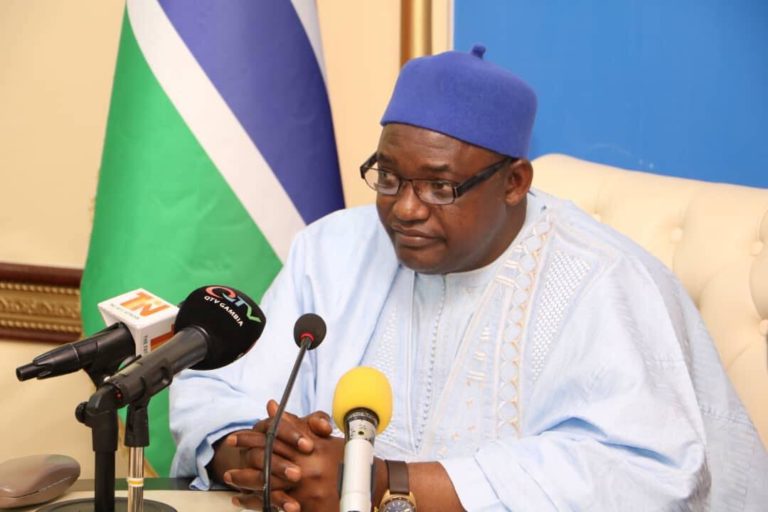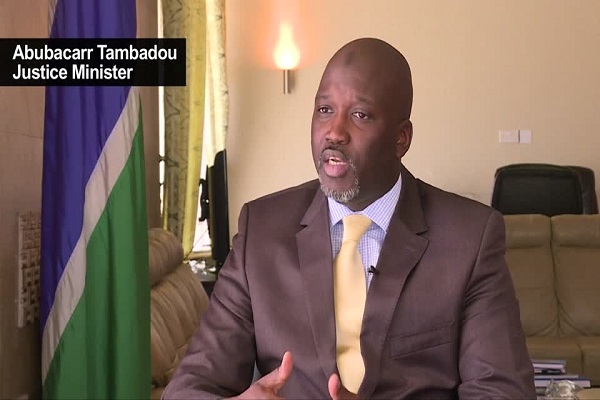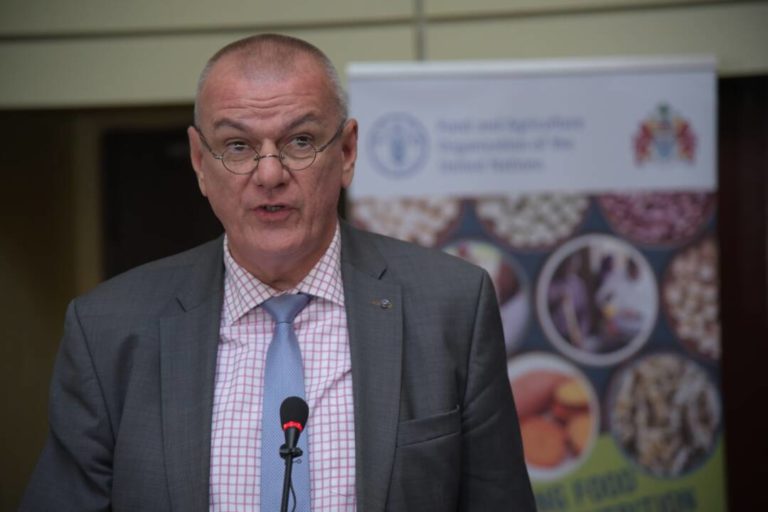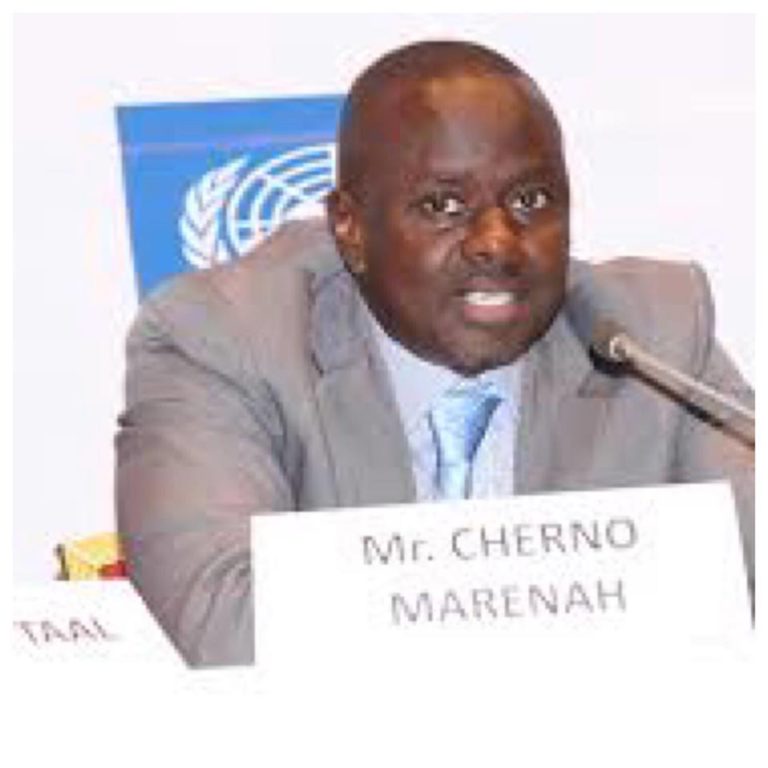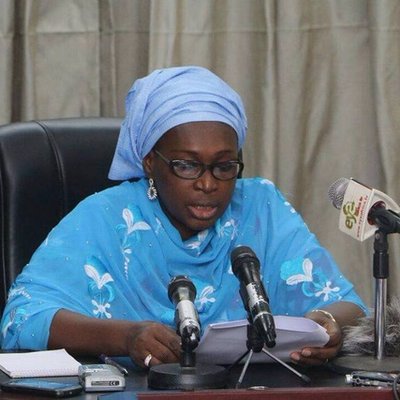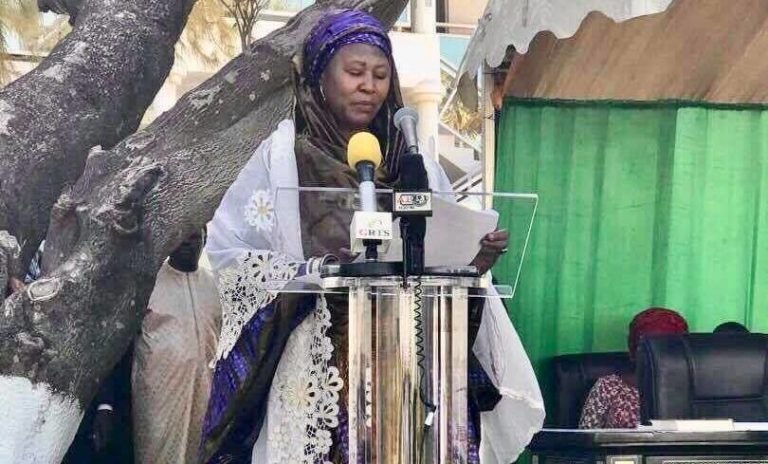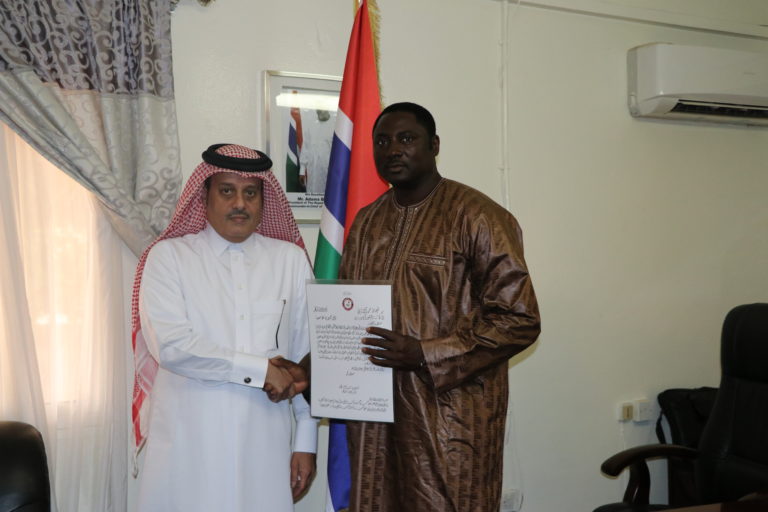End of an Era: The Enigmatic Yahya with an Illusory Legacy? There are mixed reasons to celebrate and remember July 22!
Alagi Yorro Jallow
There are reasons to celebrate the “July 22 Revolution” and remember President Yahya Jammeh in a simple way. This may be with national prayers in churches and mosques to heal and reconcile a divided and polarized nation, to move on from the whole aspect of nation-building, or to give it a more positive outlook and more positive understanding, whether it can best be described as amoral not immoral, but amoral in the Gambia’s history. The Gambian people are not blind to the darkness and oppression of the Yahya years.
Although controversies and unsolved cases marred Yahya’s 22 years rule, what will also be forever engraved in The Gambia’s history are his contributions in infrastructure development. Infrastructures were built that were unprecedented in the history of our country that provided a venue for Gambians to highlight cultural heritage, propagate arts and culture, generate tourism, improve and contribute to economic growth.
Remembering the “July 22 Revolution” might speed up the process of reckoning. This can start with the retelling of the horrors: the knock on the door before dawn for an arrest without warrant, the rape, regular beating, and water cure, the cigarette burned through flesh, the wires attached to genitals and breasts for mild electric shocks.
The struggles are worth retelling. It is the responsibility of those who lived through those difficult days to keep the memories alive for the future generations, to ensure that the abuses are not repeated. Those who dared challenge the dictatorship often paid the ultimate price. This is worth celebrating, as democracy has endured despite numerous attempts and persistent threats to civil liberties. The greed that gave rise to the word “dictatorship” has been tamed. The systematic violation of human rights is over.
Beyond the physical horrors, there was the insatiable greed for power and wealth, with the dictatorship confiscating opponents’ businesses and handing these over to cronies. As the nation is seeing, the alleged amassed wealth is mind-boggling, with 86 bank accounts, 131 movable and immovable properties, and $50 million in accounts alone, impossible for a salary of 22 years. Basically, the thrust of remembering this day is moving the nation forward from just looking back at what has happened in the past and encouraging everybody to cooperate in nation-building.
Yet, President Adama Barrow’s revolution is unfinished. Corruption remains rampant at all levels of government and democratic institutions are weak, including the police and judicial system, which has failed to make anyone accountable for the abuses of President Jammeh except the “NIA Nine” and the few “Jugglers”. Millions have not been recovered in ill-gotten wealth, and no one has been sent to prison for amassing such wealth.
According to Freedom House the Gambia’s political rights rating improved from 7 to 6 dues to Adama Barrow’s victory in the December 2016 presidential election but the regime shows little respect for personal rights and civil liberties, there is urgent needs for improvements.
The cumulative outcome and costs of President Jammeh’s dictatorship are incalculable. He was not content with simply being a president who had been reelected to four terms of the Gambian presidency. However enormous, his plunder of the nation’s wealth is only one of the costly consequences of his evil rule.
During his 22 years in power, the Gambia fell far behind several neighboring countries in West Africa in the pursuit of development, becoming “the basket case” in the region. Democracy was destroyed, the economy was in ruin, and a cul¬ture of corruption, violence, and cynicism arose.
Hundreds of Gambians were killed, imprisoned, tortured, or displaced from their homes and communities, or they simply disappeared without a trace. Also, with impunity, women were raped and degraded by the military, police, and other criminal elements known as the “Green Boys” and the “Jugglers”.
President Jammeh’s economics of debt-driven growth was disastrous for the Gambia. His regime was not interested in inclusive development, long-term state-building, or the genuine social transformation of the country, despite its “Vision 2020 Blueprint” rhetoric. Instead, President Jammeh was mainly concerned with perpetuating his personal hold on power by favoring family members, friends, and other cronies.
Thus, he simply created new elites or “oligarchs” rather than abolish them — supposedly one of his main justifications for dictatorial rule. Those who dared challenge the regime’s monopoly on power whether politicians, businesspeople, political activists, lawyers, farmers, the urban poor, journalists, or students — young or old, rich or poor — were intimidated, imprisoned, kidnapped, tortured, or summarily executed.
Section of Gambians have branded President Jammeh as merciless and even a criminal, true, but let us not forget the achievements of Jammeh’s administration before everything turned sour. It’s not always easy to see the good despite the bad, particularly because there are events which happen that we may never fully understand. The infrastructures that Yahya’s administration has left us is a reminder that we should all start building something good despite hard times. A good foundation with the right maintenance can lead to productivity
In his one of his speeches, he made a promise to make the nation great again and in a way, he did. Infrastructures were built that were unprecedented in the history of our country that provided a venue for Gambians to highlight cultural heritage, propagate arts and culture, generate tourism, improve and contribute to economic growth.
A lot of Yahya’s infrastructures today still stand like the Gambia university, Gambia Radio and Television Services, and other infrastructural developments, Kombo Coastal roads networks bridges, schools, the Supreme Courts complex and amongst others, because the people behind these infrastructures still believe that the mission of either providing a venue for performance, giving aid to the sick and connecting people is not over. Until now, these infrastructures continue to help our economy in their own aspect. Some of them are recognized landmarks that help sectors of the economy like the real estate market by increasing the value of homes or properties nearby or accessibility to establishments.
Today, the Gambian people must refuse to forget the atrocities committed by President Jammeh’s regime, and we renew our demand that the perpetrators of these crimes be brought to justice. We also reiterate our position that the government of President Barrow should relentlessly pursue and reclaim all the ill-gotten wealth accumulated by President Jammeh’s family and its cronies. Moreover, the victims and their families should be given justice and compensation in full. Any call for unity, reconciliation, and forgiveness, which bitterly divided the country, will be empty and meaningless unless truth and justice are upheld.
The Gambian people must affirm their commitment to telling the truth about the horrors of President Jammeh’s dictatorship so that it can be remembered as one of the darkest periods of the Gambian history.
The Gambian people must reject the argument that democracy does not work in the Gambia and that only a dictatorship, benevolent or otherwise, can bring our country to prosperity. We must instead encourage and harness the full democratic capacity of our people and institutions to progress as a nation. Although inequality and injustice continue to persist, we believe the solution to these problems lies in deepening our democratic institutions and practices, empowering the marginalized, and exacting accountability from our leaders and ourselves.
I condemn, in the strongest possible terms, the attempts by some individuals and particularly public figures to whitewash President Jammeh regime’s wanton violation of human rights and to distort its political and economic record. I call on all our politicians to take a definite stand on the abuses of President Jammeh’s dictatorship. I challenge them to join our call to never again allow the conditions of tyranny to take root in our society. I demand that candidates who directly or indirectly participated in and benefited from the regime apologize and, if necessary, make restitution for their role in the regime or their support of it.
I joined the Gambian people aspire to keep alive the ideals and heroism of the many brave Gambians who fought the regime. For as long as we remember and share these stories, and I believe that future generations of Gambians will learn the lessons of the years of struggle leading to the defeat of the dictatorship during the People’s Power Revolution on December 1, 2017.
The fullness of democratization, especially the creation of a political and socio-economic order, which respects the dignity of all Gambians, has yet to be achieved. It is our responsibility now to continue and complete this unfinished struggle and start with the truth
Yaya Jammeh. Yankuba Colley. FTJ.
Vanity. Unpatriotism. Idiocy.
The APRC conversation between Yaya, Yankuba and Fabakary is not only rude and immoral but also highlights the misfortune that befell a nation that was led by such a bunch idiots for so long!
The audio reflects the vanity of the APRC and these individuals in particular which goes to show, with so much pain indeed, the tragedy that befell The Gambia. To imagine that these people did indeed occupy the highest offices of the land and presided over the lives and destiny of our people for a generation indeed shows how low and misguided The Gambia was forced into.
One can see the lack of morals and decency and unpatriotism in their conversation. One can see how they devalue women and how they had lived a life of promiscuity and abuse of our women. It shows that during the APRC Dictatorship the leaders of this party had a vacation and penchant for sexual exploitation of our women and girls.
They used their position and power to misuse public resources to exploit our women and girls with impunity. They show us how they conveniently and without conscience abused and misused public wealth for their self gratification!
It’s so disheartening to hear how Fabakary Tombong Jatta would gleefully and unceremoniously joke about Yankuba using public money to enjoy women. Yet they all could laugh and take that to be normal and okay.
If anything, this audio merely shows the nature and extent of the vanity and immorality of Yaya Jammeh and his stooges. Indeed it shows that the APRC and its leadership were only engaged in prostituting our women and girls as well as plundering public resources and personalizing public institutions for selfish ends.
They do not love or care about The Gambia but they merely see The Gambia as a resource to exploit. They never stood up for any values or standards nor do they seek any tangible national objective in any way. Indeed this audio is the highest insult that could be inflicted on a society by people who are expected to serve with respect and honesty.
If there is anything we should learn from this audio is that it was good riddance that APRC Cancer was uprooted. It is to teach citizens to seek decent, moral, honest and patriotic leaders. It is to teach us to be vigilant to check our leaders and institutions including political parties to ensure that they uphold and practice good values and high standards of decency, honest politics and good governance.
Yaya Jammeh and Yankuba Colley and Fabakary Tombong Jatta are indeed the worse sons of The Gambia!
For The Gambia Our Homeland
Female Police Officer Calls For Equal Opportunities
Commissioner Lala Camara of The Gambia Police Force has called on the authorities to create equal opportunities for female officers in the service.
Commissioner Camara made these statements during a courtesy call on President Barrow by the police high command on Friday at State House, Banjul.
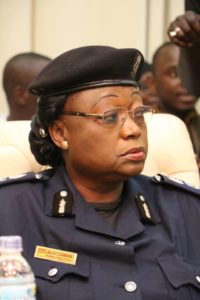
“We have only one female police commissioner in the entire force,” Commissioner Camara said.
“We are looking for equal opportunities,” she added.
Commissioner Camara told the authorities in the presence of the President, Vice President and Interior Minister that the female officers are equally good as their male counterparts in the service. She calls for the promotion of female officers in the police force.
Meanwhile, she also talked about the Female Police Network that endeavours to promote the welfare of female officers.
President Adama Barrow to Embark on Nationwide Tour
State House, Banjul, July 12th, 2018 –
In fulfillment of section 222 (15) of the 1997 Constitution of the Republic of The Gambia, His Excellency, President Adama Barrow will embark on a nationwide tour of the country to dialogue with the public on a variety of pertinent issues in the country.
The duration of the tour is ten days and will begin on Monday July 16th and end on Wednesday, June 25th 2018. During this period, the President will chair 44 general meetings and spot visits throughout the country. President Barrow will connect and engage firsthand with the members of the public on the government’s development blueprint – the National Development Plan, particularly the President’s priority areas. As the rains have begun, agricultural programmes geared towards food security, mechanized agriculture for local consumption and targeted exports will be discussed with farmers. It would allow the President to also listen to farmers and learn about issues impacting on crop production and animal husbandry. The President will use the opportunity to re-echo his call for social cohesion and unity in the pursuit of peace, security and socio-economic and political advancement of the country.
For the first part of the tour, the presidential delegation will hold meetings in North Bank Region and Central River Region-North, while the rest of week one will be spent in the Upper River Region. Over the weekend, the delegation will stop in parts of CRR South and Lower River Region. The final leg of the tour will take place in the Greater Banjul Area with a mega meeting in the City of Banjul. Please refer to the attachment for the full itinerary of the tour.
President Barrow Meets Police High Command
The newly appointed Inspector General of Police (IGP) Mamudou Jobe together with his team paid a courtesy call on President Adama Barrow on Friday at State House, Banjul.

The new IGP Jobe whose former boss Landing Kinteh resigned after the Faraba incident said the forum is historic for it has never happened in the country for over 30 years. He called Commissioner Omar Darboe to highlight some of the constraints facing the police force.
“We the police have been neglected for 30 years,” Commissioner Omar Darboe said.
Commissioner Darboe spoke about the lack of communication material, touring vehicles and salary increment as part of the constraints facing the force. He also spoke about lack of human resources and police protection amongst others.
President Barrow commended the police delegation, saying the meeting is very important but also explained his surprise that such meeting has not happened for 37 years. He added that the police is very important institution for nation building.
President Barrow advised the police command to maintain discipline and good conduct within the police force.
“Leadership is a shared responsibility,” President Barrow told the police.
Barrow emphasized that the diversity of the country should be a strength, saying that the common factor that binds them is that they are all Gambian citizens.
“Everybody is equal as far as the new Gambia is concerned,” he said.
“Security is paramount in nation building,” he added.
President Barrow called on Gambians to respect the rule of law and protect patriotism. He said people should not misinterpret democracy to disrespect other people’s rights.
“No one should take the law into their own hands”
The Gambian leader also told the security command to protect the new found democracy and nurture it.
“We cannot reverse to the old way of doing things otherwise it will defeat the purpose of the change we achieved,” he said.
He revealed the discussions his government has made with the Saudi authorities that they would start partnering with the Saudi police. He added that the Gambian police high command will be traveling there.
Ousainou Darboe, the new Vice President also advice the police to remained apolitical and refrain from tribalism.
“Your loyalty should be to the state,” VP Darboe said.
Meanwhile, he warned them to refrain from taking sides and to remain neutral.
Statement by the Ministry of Justice on Recent Events at The Janneh Commission
The Ministry of Justice notes the concerns expressed in some quarters regarding the removal of Mr Alhaji Kurang as Secretary to the Janneh Commission. The Ministry had reviewed the petition filed by Mr Kurang, and wishes to make the following clarifications for the general public.
Mr Kurang has not been victimized. His actions fell well below the standard expected of a person entrusted with such important responsibilities. He was relieved in order to ensure the integrity of the Commission and for the continuation of its smooth operation.
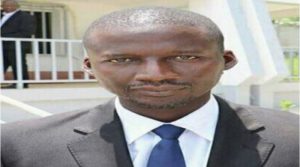
The Janneh Commission operates like a civil court in many respects. Similarly to a civil court, the role of the Commissioners is similar to that of the judge; the role of Counsel Amie is similar to that of counsel for the plaintiff; former President Jammeh and his close associates are the presumed defendants; and the role of the Secretary is similar to that of the Registrar of the court. As in a court of law, each of these positions carries certain responsibilities which are clearly delineated.
The Commissioners, in their role as judge so to speak, are exclusively responsible for making orders suo motoor on the application of the plaintiff or the defendants or witnesses or any other interested parties to the proceedings. The Commissioners have the final say as far as the proceedings before the Commission are concerned.
Counsel Amie is not a Commissioner and does not make any orders. The Attorney General hired her services to represent the interests of the State and she carries out work that should have been carried out by staff of the Ministry of Justice. She works for the State and her role is to assist the Commission establish the facts.
The Secretary Mr Kurang is responsible for the administrative aspects of the Commission’s work such as recording the proceedings, keeping documents, summoning witnesses etc, and acts under the direction of the Commissioners. He is basically the executioner. As Secretary, performing the role of Registrar, his position is one of neutrality between the parties to proceedings before the Commission.
The Allegations
Essentially, Mr Kurang makes three major allegations against Counsel Amie: (1) that Counsel Amie engaged in wasteful spending of Government resources on foreign trips and Commission activities; (2) that Counsel Amie is conflicted given her past association with some of the organizations that are the subject of the Commission’s enquiry; and (3) that she colluded with her brother Secretary General Habib Drammeh to frustrate and stop the sale of tractors by the Commission. We will address these issues in turn.
On the issue of expenditure and foreign travel, all foreign trips are for the purpose of international investigation and are approved by the Ministry of Justice and not Counsel Amie. The composition of the investigation team of police officers is decided upon by the Ministry. Such travel includes investigators and counsel and are strictly for investigative purposes which remain privileged and confidential until further notice.
The second point to note is that Mr Kurang, as Secretary to the Commission (similar to the position of Registrar of the court), has no legal standing to raise issues of potential conflicts of interest between the parties. It is for the parties to the proceedings before the Commission or witnesses or other interested parties to raise such matters for the consideration of the Commissioners. In fact, there was an earlier attempt to do so by one of the witnesses who appeared before the Commission. By so doing, Mr Kurang had descended into the arena and acted beyond the confines of his administrative responsibilities as Secretary. Notwithstanding, the Ministry went ahead to determine the veracity of his allegations and concluded that they are unsubstantiated for the reasons given below.
This Inquiry is for the benefit of Government institutions. Such institutions are not under investigation. It is the dealings of former President Jammeh with these institutions that is under investigation.
Counsel Amie’s past engagement with some of the organizations appearing before the Commission was disclosed and known to the Ministry at the time of her appointment and has always been a matter of public record. At the time of her appointment, the Ministry enquired and was assured that Counsel Amie has never worked for or been engaged in any manner with former President Jammeh or taken instruction or been in any way involved in any transaction either directly or indirectly between former President Jammeh and the said institutions. This, and her knowledge of Government institutions, among others were precisely the reason she was chosen for such an important assignment.
The issue of conflict of interest does not arise by virtue of such engagement alone. Among other things, it must be demonstrated that Counsel Amie derived personal benefit from her position as Counsel to the Commission vis-a-vis her past engagement with the said organizations or that she was instructed by a potential adverse party in connection to a matter currently under investigation. This is not the case and Mr Kurang failed to demonstrate this in his complaint. A mere allegation on the basis of perception is insufficient to warrant further consideration.
There is in fact one instance where the issue of potential conflict of interest arose and the Ministry had instructed another Counsel to take over that matter before the Commission. Counsel Amie had been so informed, infact she is the one who drew the attention of the Attorney General to the potential conflict and sought directions from him. Both Counsel Amie and the Attorney General agreed that out of an abundance of caution another counsel should handle that matter. The Ministry had already engaged Counsel Musa Batchilly to consider taking over this matter and he has agreed in principle subject to terms. This shows that both Counsel Amie and the Attorney General are mindful of their professional obligations in this regard. Issues of conflict of interest and bias are ethical matters of extreme concern and the general public may be assured that every case file is reviewed in this connection.
Regarding the allegation that Counsel Amie colluded with her brother Secretary General Habib Drammeh to frustrate and stop the sale of tractors by the Commission, this also merits no further consideration. It is not all allegations that warrant formal investigations. There has to be a minimum evidentiary threshold to warrant such action. Let us look at the facts in respect of this allegation:
The said tractor sale was announced in local media by the Commission without notice to the Ministry or the Government (which demonstrates the level of independence the Commissioners operate with). This public announcement of tractor sale came to the attention of the Government and the matter was raised in Cabinet. Cabinet then decided that a request should be made to the Commissioners for the suspension of the sale of the tractors as the Government is considering giving the tractors out to farming communities across the country in view of the imminent rainy season. This Cabinet decision was conveyed to the Commissioners from the Office of the President through the office of Secretary General Habib Drammeh who happens to be a brother to Counsel Amie. In so far as the Ministry is concerned, this is the only basis upon which Mr Kurang alleges collusion between Counsel Amie and the Secretary General Habib Drammeh. In the Ministry’s view, this alone is insufficient to warrant further action.
Furthermore, it is important to underscore that Counsel Amie has no authority to order or suspend any sale. This is the exclusive preserve of the Commissioners. Even when Counsel Amie makes a request to the Commissioners, the ultimate decision lies with the Commissioners to grant or not grant her request. Therefore, the allegation that Counsel Amie colluded with her brother the Secretary General to frustrate and stop the sale of the tractors lacks merit.
Moreover, there is inherent inconsistency in Mr Kurang’s allegations in this regard. On one hand, Mr Kurang alleges that both Counsel Amie and her son, the Mayor of KMC, Mr Talib Bensouda, had enquired about the sale of the tractors and expressed interest in purchasing same. On the other hand, Mr Kurang alleges that Counsel Amie frustrated the sale of the tractors in order to stop the sale. The Ministry finds these allegations largely inconsistent and contradictory.
It must also be noted that Mr Kurang works under the direction and supervision of the Commissioners. If he had any concerns about any of the issues before the Commission including any perceived interference in his work by Counsel Amie, the proper thing for him to do was to bring his concerns to the attention of the Commissioners for their reaction. He did not do so. Instead, he only copied the Commissioners in his correspondence to Counsel Amie. That was improper.
Therefore, as the entity that hired Counsel Amie for this work, the Ministry finds nothing in Mr Kurang’s allegations that merit further consideration or action such as initiating a formal investigation. In our view, the allegations by Mr Kurang against Counsel Amie do not meet the minimum evidentiary threshold to warrant a formal investigation. There is no prima faciecase so to speak.
Finally, having made these unsubstantiated allegations against Counsel Amie, it will be unreasonable to expect the Commission to function smoothly thereafter. Mr Kurang’s actions have clearly engendered mistrust and a lack of confidence by his conduct. In consultation with the Commissioners, it was agreed to relieve him of his responsibilities as Secretary and His Excellency, the President, acted accordingly.
The Commissioners and Counsel Amie have exhibited a high degree of competence, professionalism and integrity throughout the operation of the Commission. We remain satisfied in the manner in which they have conducted their work with diligence, adherence to due process and fairness. Their work speaks for itself.
“Those who cannot remember the past are condemned to repeat it.”
Alagi Yorro Jallow
I am still struggling to get my mind around what democracy means for our collective future. I won’t try to sort it out here in a Facebook post. Alas! The liberty of a democracy is not safe if the people tolerate the growth of private power to the point where it becomes stronger than their democratic state itself. That is a dictatorship—the ownership of a government by an individual, by a group, or by any controlling private power is an anathema to democracy.
What I will say is that what happened can’t be explained simply as a failure of the political establishment—although it has failed spectacularly. Nor is it simply a problem of demagoguery or sycophancy—although both are alive and well and flourishing at this moment. Nor is this fledgling democracy simply a matter of humans being treated as disposable—like plastic bottles tossed in a landfill—as political and social media elites spew propaganda that encourages us to view “the others” as the enemy.
The problem runs deeper than all of that. The truth is we are stumbling badly in large part because we are just beginning to learn to walk. Roughly 22 years ago, we had a quasi-democracy; it was not a true democracy by any stretch. We still don’t have a real democracy. But we’ve recently managed to revive a new democratic-like system. In the words of William Faulkner, “The past is never dead. It’s not even past.” Our leaders should be aware of democracy and avoid demagoguery but again be mindful of “clicktivism and sycophantism politics.”
It is said that humans are creatures of habit; perhaps that is why George Sanataya cautioned, “Those who cannot remember the past are condemned to repeat it.” On the other hand, maybe you agree with Mark Twain who said, “History doesn’t repeat itself, but it does rhyme.” In today’s Gambia, with what rhyme and reason do we proceed? As we listen to our nation’s leaders and watch their ways, it is becoming quite apparent that history continues to repeat itself. Consider the following.
Our political leaders are often misadvised and misdirected because the majority of those they rely on to govern are demagogues and sycophants who hardly tell them the truth.
The extent to which demagoguery and sycophancy have taken over reality and stunted our political development can be gauged from the daily praising of failed politicians, so-called muckrakers, and spineless pundits on social media, often selling to innocent Gambians falsehood and propaganda to the extent that the wrong people are appointed to sensitive and important positions. No leader would say that things should not move forward in the country.
The problem is the people around them, who don’t advise them well. I have observed that ninety-nine percent of people who hover around our political leaders are sycophants and praise-singers. Let us be frank with our leaders to get us out of where we are today. Gambian politics is in trouble because the citizens have allowed deception, denial, disinformation, diversion, evasion, exaggeration, indoctrination, lying, media manipulation, mind control, propaganda, scapegoating and smear campaigns, which are the signs of sycophancy in our politics and governance.
I believe our democracy must be freed from the suffocating grip of an all-knowing typical “African Big Man” myth. Comrades Solo Sandeng and Deyda Hydara, along with other folks, did not die for us to have a quasi-democracy. They died so that we can be free; they died so that we can reap the abundant benefits of a democracy. Think of Colonel Lamin Sanneh, Captain Ngaga Jagne and others who died fighting for our democracy. Gambians will spit on their graves when we let democracy slip away into the sewer of benevolent dictatorship akin to Yahya Jammeh. Never Again!
Gambia is a country ready to be taken—in fact, longing to be taken—by political leaders ready to restore democracy and trust the political process after all the bitter horrors of Yahya Jammeh’s rule.
The Gambian people don’t want a democracy that can’t guarantee its citizens one square meal a day, a democracy that can’t guarantee three hours of electricity daily, a democracy that can’t afford to allow people to protest, a democracy that can’t guarantee the freedom of the press and of speech and respect for the Constitution, a democracy that is standing on its head, a democracy that takes one step forward and three backward.
Let us never forget that the government is ourselves and not an alien power over us. The ultimate rulers of our democracy are not President Barrow and government officials, but the voters of this country. The government is us; we are the government, you and me. We can heal the wounds of this nation or aggravate such wounds. We can bring peace to this nation or cause chaos to erupt in it.
We are very hungry for a new beginning. We want President Barrow to help “Make the Gambia Great Again” by making our institutions strong, as strong institutions would make our democracy great again. We want our leaders to build a thriving multi-ethnic, multi-faith, egalitarian democracy out of the rubble of dictatorship. Gambian people are interested in being part of something larger than the sort of small, petty, slash-and-burn politics that we have been seeing over the past several years.
EU Ambassador Calls On Government To Engage Diaspora Gambians
Attila Lajos, the EU Ambassador to The Gambia has called on the Barrow government to engage diaspora Gambians
who have very successful careers.
It would be recalled that diaspora Gambians have contributed significantly towards ending the 22 years dictatorship in the Gambia through fund raisings for the coalition, talk shows and meetings with members of the international community amongst others.
“Gambians are very successful in the diaspora,” Ambassador Attila Lajos said.
“Its all over the news,” he added.
Ambassador Lajos said the Gambia Government should organise events to invite diaspora Gambians to explain what they can do for their country. He gave an example of the legal forum that brought togther Gambian practioners from home and abroad.
“That is the government’s responsibility,” he said.
The EU
Ambassador further explained the potential in the diaspora Gambians highlighting the media personnel that came back to invest in the country.
Meanwhile, the Ambassador acknowleged that two members of the Constitutional Review Commission (CRC) are from the diaspora.
Please note that this article is from The EU Ambassador’s last press briefing held sometime in June.
CONSIDERATION OF THE GAMBIA WRITTEN RESPONSE TO THE LIST OF ISSUES ON THE ICCPR DURING THE 123RD SESSION OF THE HUMAN RIGHTS COMMITTEE ON THE 5TH & 6TH JULY, 2018 IN GENEVA, SWITZERLAND
PRESS RELEASE, Ministry Of Justice
The Gambia as a State Party to the International Covenant on Civil and Political Rights (ICCPR) has finally fulfilled its reporting obligation under the Covenant on the 6thof July 2018. The ICCPR recognizes the inherent dignity of each individual and undertakes to promote human rights conditions within State Parties to allow the enjoyment of civil and political rights of the people. Countries that have ratified the Covenant are obligated to submit an initial report and subsequent periodic reports to the Human Rights Committee and The Gambia is no exception.
The Gambia, however, had failed to submit its initial and subsequent Periodic Reports over the years. In the absence of submitting these reports, the Committee forward a List of Issues sometime in April this year following which a detailed written response was submitted by the Ministry of Justice entailing the Government’s achievement in the implementation of the provisions of the Covenant most viable in the areas of Health, Access to Justice, Education, rights of Women & Children amongst others.
Following an invitation by the Committee to its 123rdSession held in Geneva, Switzerland, a high level delegation comprising of the following: Mr Cherno Marenah, Solicitor General & Legal Secretary,
- Ebrima Sisawo, Permanent Secretary, Office of the President
- Cherno Omar Barry, Permanent Secretary, Ministry of Health and Social Welfare
- Bulli Dibba, Permanent Secretary, Ministry of Interior
- Lala Jaiteh– Deputy Permanent Secretary, Ministry of Basic and Secondary Education
- Kajali Sonko– Deputy Executive Secretary, Women’s Bureau
- Matilda A. Mendy– Senior State Counsel, Ministry of Justice
- Bafou Jeng– State Counsel, Ministry of Justice
The delegation headed by Mr Cherno Marena, successfully engaged in a constructive dialogue with the Human Rights Committee, regarding the administrative, judicial and legislative measures put in place by the Government of The Gambia towards the promotion and protection of basic human rights of the people of The Gambia in accordance with the ICCPR.
The government of the now awaits the concluding observations and recommendations from the Committee which will assist the Government of The Gambia in the continued promotion, protection and fulfilment of the human rights of the people of The Gambia.
For more information, kindly visit this link: http://webtv.un.org/meetings-events/human-rights-treaty-bodies/human-rights-committee/
State House Media Briefing Notes
Media Briefing
11thJuly2018
Good morning colleaguesand welcome to our media briefing.
Environment
The operations of the Fishmeal plant in Sanyang has been suspended until the existing laid down requirements have been fulfilled. Also,the one in Kartong has been closed down because the water treatment plant is not in the right shape, and the case is at the courts. Meanwhile, the President has been informed that the Kartong VDC wants the plant to re-open; however, the technical advice receivedby the president recommends that the plant donot reopen unless it has met the required standards.
Land Matters
The President has instituted aninterim body to find out about all the land areas under dispute in the country, and it has been reported that 40 hotspot sites have been identified. While waiting for the establishment of the Land Commission, a Crisis Management Committee, chaired by the Secretary to Cabinet, has been set up as a temporary measure to look into the crisis.
Interior
The peace and security situation in the country has been generally calm until the Brikama incident where a man was killed. Investigations have been done and those that are suspected to have been involved are now remanded in custody. Contrary to earlier media reports that identified a driver and his apprentice as the alleged perpetrators, the alleged killer and a witness to the killing have come forward with confessions to the act.
National Documents
On the Printing of national identity cards, Semlex is the contractor and the details of the contract are being reviewed. The President has been briefed that the review process of the agreement with Semlex is at the final stages.
Inspector General Police
The Deputy IGP Mamour Jobe has been confirmed as Inspector General of Police and Abdoulie Sanyang is now the Deputy IGP.
H.E. Meeting the Police Command
On Friday, His Excellency will hold a meeting with the heads of the Gambia Police Force at 10:00 AM at State House.
Demiseof ECOMIG Soldier
The president has sent a condolence letter to the ECOMIG Commander Colonel Fulgence N’dour on the demise of a member of his command, Staff Sergeant Abubacar Abdulahi, who passed away by natural cause last week. Meanwhile, diplomatic and security arrangements are being made to repatriate the body to Nigeria.
Justice
The President has also been updated that it was no longer tenable to have Mr.Alhajie Kurang as Secretary to the Janneh Commission and has since been replaced.
Transportation
A policy decision has been made to allocate some of the 20 Turkish buses donated to The Gambia to Edward Francis Small Teaching Hospital (EFSTH), Management Development Institute (MDI), University of The Gambia (UTG), Gambia National Army (GNA). The rest will be used for public transportation under the management and maintenance by the Gambia Transport Service Company.
Meanwhile, the Government Vehicle Policy has been finalized and will be submitted to the National Assembly for approval.
Agriculture
The President has been informed about the French government’s interest to support irrigation farming in the Upper River Region.
Faraba Victims
The President has been informed that none of the victims admitted needs overseas medical treatment. Most of them admitted at the EFSTH have recovered and are being discharged. The latest information is that only a couple of people are still being admitted for treatment.
Social Security and Housing Finance Corporation(SSHFC)
The new board of SSHFC will be meeting with the new Finance Minister, and if there is the need to have an independent body to look into the matter, it will be done. Meanwhile,the sit down strike by the staff ended yesterday.
The Resignationof the Vice President
President Barrow accepted the resignation of the former Vice President Fatoumata Tambajang from the government of The Gambia. In a letter dated 4thJuly 2018, Madam Tambajang declined the offerto serve in the Foreign Service. Her resignation came after she had been relieved of the position of Vice President and offered to work in the Foreign Service. She gave personal and professional reasons for her decision, and it was accepted by the President.
Upcoming Engagements
- President Barrow will attend the opening ceremony of the ECOWAS Regional Competition Authority Meeting, tomorrow, Thursday, 12th July2018 in Bijilo. He would later chair a Cabinet meeting at the State House.
o On Monday, 16thJuly 2018, PresidentBarrow will embark on a nationwide tour to meet with a cross-sectionof Gambians and discuss national development issues. As you may be aware, it is a constitutional requirement for the President to go round the country at least once a year to hear the concerns of the people, see firsthand development project and share with government development plans and policies.
Thank you for your kind attention. I will now take yourquestions. As usual please, identify yourself and the media house your represent.
Former VP Declines Foreign Service Appointment
Ms Fatoumatta Jallow Tambajang, former Vice President of The Gambia has reportedly resigned from her appointment to the Foreign Service.
Ms Tambajang’s resignation came shortly after a major cabinet reshuffled that took her out of office as the country’s number two most powerful person. She was redeployed to the foreign service whilst key figures like Omar Amadou Jallow and Demba A Jawo were relieved from their cabinet appointments.
The Director of Press & Public Relations at the Office of the President, Ms Amie Bojang Sissoho told journalists that President Barrow has accepted the resignation of the former Vice President to the Foreign Service.
“President Barrow has accepted the resignation of the former Vice President in a latter dated on the 4th July,” Madame Bojang Sissoho said.
She further explained that the reason given by the former VP was based on personal and professional grounds.
Ms Bojang Sissoho in her press briefing highlighted the land disputes across the country at which 40 hotspots were identified while a temporal committee was setup to resolve the matter.
She also spoke about the Turkish buses donated to The Gambia part of which she said will be given to the University, GTTI, MDI, National Army and the rest for public transport.
Meanwhile, President Barrow would embark on a nationwide tour starting Monday, 16 July.
Minister of justice did not mislead the concept of protest: Let’s keep the conversation clean
Bravo to the office of AG, IGP and GRTS for a wonderful civic engagement program called status of our law and security way forward. The program is long overdue and it is mesmerizing to see an activist, IGP and AG on the same platform discussing the state of our democracy.
The civic engagement since the rebirth of New Gambia, have deepen our love for our country and our people. It is a love full of pride for our virtue and with patience for our failings. We are a fractious nation, always searching, always dissatisfied, yet always hopeful.
We have an infinite capacity to rejuvenate ourselves. We are self-correcting. And we are capable of caring for each other. In this new dispensation of our discontent, I find it heartening to look back to 22 years of dictatorship. Remember during the 22 years of Jammeh when people wondered how we could end the brutal assault on our rights?
But we came roaring back, we prevail over the cynics. We came through because the resilience of some of our patriotic sons and daughters who stood up to Jammeh despite all the odds. As Gambians, we will continue to flourish because of our multilineage society which has strength and resilience as we continue to find our niche in our new democracy.
Attorney General Ba Tambedou and Mr. Mamour Jobe Inspector General of Police appearance on GRTS underscore our government’s commitment to create an environment where divergent views are encouraged. Both leaders represented the government very well on the show and they have communicated clearly some of the misconception when it comes to protest and steps involved in changing some of the laws on the books.
Ba Tambedou as the Chief Prosecutor of the Executive Branch did a fabulous job in clearly explaining the process and processes involved in changing the law as well as security implications when it comes to protest. Mr. Tambedou was very prepared, knowledgeable, articulated his position well when it comes to the rule of law, freedom of assembly and movement.
Both Honorable Tambedou and Mr. Jobe’s engagement with Activist Alieu Bah on GRTS was very commendable due to the fact that the exchanges were very cordial, civil and exhibited in a very professional manner. Ba Tambedou at no point during their appearance on GRTS demonize activist Alieu Bah as Madi Jobarteh wants to believe. Madi’s continue hyperbole, excessive obsession when it comes to protest and the constitution, as if he has complete monopoly over these issues should give us pause due to misconception conveyed to the general public.
Madi applauded the patriotism of Alieu Bah which no one will dispute but how about Ba Tambedou who gave up other opportunities to serve his country? How about Ba’s active engagement in the struggle to dislodge the dictator? If Madi does not know please find out from others.
Madi asserted that Ba Tambedou and his family are comfortable thanks to tax payers, well what Madi failed to understand and acknowledge was the opportunities our current AG gave up to serve in Barrow Administration for the love of country. I will highly encourage the IGP and AG to continue their wonderful civic engagement especially in our local languages it is very educational.
It looks like the information shared with the masses does not sit well with some of our activists. The conclusion is maybe the AG hit a nerve which triggered a reactionary article rapped around emotional outburst by Madi.
Ba is very progressive, he worked tirelessly to create an environment where continue dialogue and civil society engagement is at the forefront. He is the most media friendly Attorney General in the history of our Republic. Ba Tambedou represents the cliché of people who value honesty above all else, followed by being forward-looking, competent, and inspiring.
These traits fell under the larger umbrella of credibility, which is declared as the foundation of leadership. Jafferson once wrote, “There is a debt of service due from every man to his country, proportioned to the bounties nature and fortune have measured to him”. My last word to Madi, Ba Tamedou’s responsibility, our responsibility as lucky Gambians, is to try to give back to our country as much as it has given to us, as we continue our New Gambia journey together.
General Powell once said “Avoid having your ego so close to your position that when your position falls, your ego goes with it”. I am not a spokesman for the AG nor the government however it is our fiduciary duty to keep each other on a true course. Thank you! May God continue to bless the Gambia and her people.
Sariang Marong
Vancouver, Washington U.S.A
Print Media Compromised in The Gambia
Alagi Yorro Jallow:
Serious print journalism in the Gambia died a long time ago. Print media failed to keep up with social media; such that what one read in print had already debuted on social media and national television on the previous night.
Every newspaper has a set of journalists and regular columnists pushing parochial agendas, without the prerequisite objectivity. There was a time I believed in everything I read in the local print media. Many years later; however, I don’t even believe the headline story. I treat every newspaper article with skepticism. In modern new Gambia, any sensational content is because of two things; a brown envelope (bribe) and/or government propaganda or a combination of the two.
Journalists today do not research or verify facts. Most articles have screaming headlines but are thin on facts. Business media is even worse. There is rarely an investigative story about a company or a business executive. All bad corporate news is filtered at the behest of a bribe. Business journalism or economic journalism has a symbiotic relationship with the corporate world. In exchange for advertising revenue, all business media must do is to regurgitate corporate press releases. The last time I read a serious piece of investigative business journalism was a long time ago. The story was about a vicious battle for SLOK Air (an airline) between governor Kalu of Nigeria and the Gambia government that was apprehensive of the airline’s worthiness. It was written by Pa Kemo Jarju and Sana Camara of the independent newspaper. A good piece of writing is difficult to forget.
Some publications promote con men who are aptly branded millionaires, scumbags who own companies that do not even exist in the register of companies. Another area of expertise is the promotion and praise of fraudulent real estate projects. The simple real estate property scandals are a real example how journalists aid and abet fraud. These realtors purported to offer housing on a “rent-as-you-buy” basis, zero deposit down, at zero interest for 25 years. These real estate business owners had no completed residential real estate project in the country. Yet, journalists from the print and electronic media kept on writing about how the real estate company was facilitating home ownership of ordinary Gambians. A simple question would have lifted the veil on the scam. “How was Simple Homes going to finance the houses at zero interest? Who is this that was giving them free money?
The media is dead quiet with the “behind-the-scenes” details. Gambian journalists have the tendency to build fake biographic profiles of individuals for various motives. This is especially so for people who want to pass off as successful businessmen. This is done in case a potential customer performed a Google search about a particular individual, so that the search results will yield an article about that individual in the mainstream media, which increases credibility and draws in the client.
With a few thousand Dalasis notes and a few rounds of food at pubs, some journalists will help you create a fake profile in the media. You do not need to look very far to know what the man does for a living!
Then you have online versions of mainstream publications that have literally turned themselves into digital tabloids. It seems the online version of print media is in competition with sensational blogs for readership. The online version of the print media is the real digital kitchen sink, including fake news and stories not worth the news title. Furthermore, the writing is half-baked, hurriedly written, and poorly revised. The online news is an effort to attract eyeballs quickly, for advertising revenue, at the expense of credibility and quality.
Our newsrooms are overflowing with compromised journalists and agents of the state. Refer to the shabbily assembled headline stories every week to understand this industry. The writer of these stories is first and foremost, for convenience, “faceless” and the articles are an assembly of insinuations.
In the Gambia, state agents shape screaming stories, while complicit media houses simply publish them. Many stories in both print and electronic media are occasionally the handiwork of state agents and shoddy politicians. Our Newspapers are “afra” wrappers
Hollywood African Prestigious Awards Nominate Sankanu’s PAIN OF SORROW for Best Film 2018
Prominent Gambian filmmaker, Prince Bubacarr Aminata Sankanu, has recorded another achievement in his goals of making The Gambia an internationally recognized film-making nation. The members of the Hollywood African Prestigious Awards (HAPAwards), notably, I Dream 4 All Foundation and African Oscars, LLC, in Beverly Hills, California, have nominated Prince Sankanu’s PAIN OF SORROW for BEST MOTION PICTURE (film) 2018.
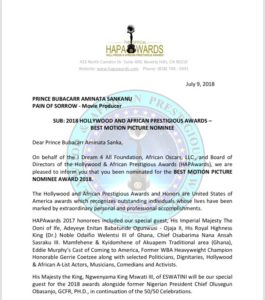

The Hollywood and African Prestigious Awards and Honours are United States of America based awards which recognizes outstanding individuals whose lives have been marked by extraordinary personal and professional accomplishments. The HAPAwards 2017 honorees included Eddie Murphy’s Cast of Coming to America film, selected politicians, dignitaries, Hollywood and African A-List Actors, Musicians, Comedians and Activists.
ABOUT PRINCE SANKANU
Prince Bubacarr Aminata Sankanu of Sotuma Sere is a pioneer filmmaker and founding father of the New Gambian Cinema called CINEKAMBIYA.
Prince Sankanu made some of the ground-breaking Gambian feature films such as BLEEDING BLADE (2017) on Female Genital Mutilation; PAIN OF SORROW (2017) on the discrimination of girls with disability; KUU BUKA LABANG (2017) a Mandinka language film on changes in destiny; HISIRINWALLE (2017) a Sarahulleh language family drama on ungratefulness.
Sankanu is co-producer of two other latest films like FAASIKE (2018) with Bubacarr Zaidi Jallow and CHOSSANO (2018) with Papis Kebbah Jobarteh and Frank Adim.
Apart from feature films, Prince Sankanu also makes documentaries. He is Executive Producer of a new documentary on the epic of KELEFA SAANE, pre-colonial Sene-Gambian hero directed by Fenja Braster. The KELEFA SAANE documentary is expected to be premiered in The Gambia during the course of 2019.
The Gambia’s premiere annual CINEKAMBIYA INTERNATIONAL FILM FESTIVAL (CIFF) was founded by Prince Bubacarr Aminata Sankanu in 2015. He runs the SANXAANU KAGGORO FILM KAFFO (SANXAAFI) and TAGADOU PRODUCTIONS and has single-handedly mentored, trained and integrated over 180 Gambian youths into the film trade in 2017 alone.
To promote solidarity, synergy and sustainable capacity building, Prince Sankanu created the “TEAM SANKANU- Pioneers of New Gambian CINEKAMBIYA” film collective in 2017.
Sankanu holds, among other qualifications, the academic Master of Letters in Film Studies: Theory and Practice, from the University of Stirling in Scotland, UK and professional Digital Film and Animation Diploma from the SAE Institute in Cologne, Germany.
In 2016 Prince Sankanu won the BEST CULTURE PROMOTER of the MBE IMPROVER AWARD in UK and in 2017 was named Ambassador of The Gambian Film Industry by the Film Producers Association of The Gambia (FPAG).
***
QATARI AMBASSADOR PRESENTS COPY OF LETTER OF CREDENCE TO FOREIGN MINISTER DR.TANGARA
The Ministry of Foreign Affairs, International Cooperation and Gambians Abroad (MoFA), would like to inform the general public that the new Ambassador of the State of Qatar to The Gambia, His Excellency Mr Faisal Fahad Al – Mane, Tuesday July 10th presented copy of his Letter of Credence to the Honourable Minister of Foreign Affairs, Dr Momodou Tangara, in his office in Banjul.
Ambassador Al – Mane replaces the former Ambassador Mohammed Nasser al – kaabi whose tour of duty ended in June 2018.
In what has become his first bilateral engagement since his appointment as Foreign Minister, Dr Tangara expressed optimism that Ambassador Al – Mane’s term will boost the already deep ties of bilateral cooperation between The Gambia and the State of Qatar, noting that Qatar is a true partner, since the establishment of bilateral cooperation between the countries.
Ambassador Al – Mane looks forward to finally present his Letter of Credence to His Excellency President Adama Barrow to be followed by deeper engagements on ways to promote cooperation.
In a different engagement, the Ambassador of the People’s Republic of China, His Excellency Zhang Jiming, paid a courtesy call to the Honourable Minister and congratulated him on his appointment as Minister of Foreign Affairs.
“Justice Delayed Is Justice Deny” Accused NIA Agent
One of the senior NIA Agents currently facing charges in the murder of Solo Sandeng has expressed his frustrations at the low speed of their trial after a year and half into the case.
“Justice delayed is justice deny,” Accused NIA Agent said.
The eight NIA operatives including the Agency’s former Director General, Deputy Director General and Operations Director amongst others were arrested in February last year in relations to the murder of Solo Sandeng, former UDP youth leader who was allegedly tortured to death in custody under the watch of the former President Yahya Jammeh. They have all pleaded not guilty to the charges preferred against them. They were since remanded at the state central prison at Mile II in Banjul.
The alleged agents after appearing in court for almost seventeen to eighteen months have not still enter their defense.
“Many of us are the breadwinners of our families”
“They should make a speedy trial in the interest of justice,” he added.
The agent said they are Gambian citizens like anyone that deserve to enjoy every rights guaranteed in the Constitution.
“We should be treated innocent until proven guilty by a competent court of law”
He said he already discussed with his lawyer the charges preferred against him as well as wrote his own statements, saying that the state should have thoroughly investigated the matter before their arrests.
What Epitomizes Good Governance and Exemplary Leadership?
Alagi Yorro Jallow
Election victory is not a test of exemplary leadership, it is simply a process of democracy. Effective governance and transformational leadership are about positive influences. Any leader who deliberately makes your life miserable is not a true leader – at best, he is your dictator. Good governance and exemplary leadership is premised on vision, mission, passion, resilience, empathy and compassion. These elements are the basis for program conceptualization, alignment and implementation.
A progressive agenda is a well-thought out and encapsulated in processes that provide national integrity in line with existing framework, as described by Professor Anthony and Professor Robert Rothberg.
Having seen what democracy is all about including the principle of liberty, one would be tempted to once more ask – what good governance and exemplary leadership is all about?
In answering this question, it is necessary to note that governance and leadership in its generic sense means different things to different people especially when you morphed from dictatorship to democracy.
However, in real life and practice, good governance implies a high level of organizational effectiveness in relation to policy-formulation and the policies pursued, especially in the conduct of economic policy; and its contribution to growth, stability and overall well-being of the citizens. Good governance also implies accountability, transparency, participation, openness and the rule of law – a pre-requisite for political legitimacy.
Good governance as we must all know is not a systemic issue. It lies at the heart of behavior of the leadership and the public office holders, their behavior and attitudes to power, their empathy and concern for the poor.
The implication of this is that only the best people should hold public office. They should be the most righteous and wisest persons of character and distinction, of honor and integrity; they should be dependable and example setters. Exemplary Leadership principles and methods requires change or transformational management process. Leadership requires integration of best practices and effectively applied for the common good.
Transformational Leadership is principles-based in which ‘Team’ is critical factor – a great marriage between the Transformational Leader and the Led based on reciprocal bonding. There is a shared vision inspired by a collective bargaining for the public good, where experiential wisdom is pooled, and lessons learned are funneled for continual improvement. Naturally, the success of the Transformational Leader is based on alignment and synergy in work process implemented by subordinates across all tiers of governance. These are the kind of people we need in power more especially in New Gambia.
A nation where all it presently prides is nothing, but core traits of bad governance amplified. A nation where the government in power makes arbitrary policies, unaccountable bureaucracies, unenforced or unjust legal systems, abuse of executive power, a civil society unengaged in public life and widespread corruption. Yet some people will come to the open and shower praises on the same government. This is shameful. And bad governance epitomizes a system of governance that has done perfectly well to constantly showcase its ineptitude and lack of vision.
It is a known fact that in New Gambia people are yet to really feel the impact of substantive democracy and good governance. The living conditions of the people is at its lowest, hopes have been shattered due to low salaries and low standard of living, unemployment, lack of infrastructures, unmotivated youths, increase in the poverty level, hunger and starvation.
Conclusively, it is conceivable that supporting the Barrow administration is not just an inevitable option but also a civic duty to make The Gambia a beacon of hope. The Gambian people need the change process to begin with the political leadership. What the Gambia needs are Leaders and followers who are humble enough to accept deficiencies and accept appropriate assistance and guidance. Gambians need listening leaders. The Gambian people need collaborative political leaders who would not compromise the interest of The Gambian people


